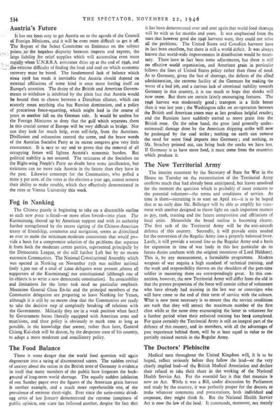Fog in Nanking
The Chinese puzzle is beginning to take on a discernible outline as each new piece is fitted—or more often forced—into place. The Kuomintang, shored up by American support and with its authority further strengthened by the recent signing of the Chinese-American treaty of friendship, commerce and navigation, seems as disinclined as ever to make the minimum moderate concessions that would pro- vide a basis for a compromise solution of the problems that separate it from both the moderate centre parties, represented principally by the Democratic League, or the still further Left but by no means extremist Communists. The National Constitutional Assembly which was opened in Nanking on November 15th was neither national (only 1,300 out of a total of 2,000 delegates were present ,almost all supporters of the Kuomintang) nor constitutional (although one of its objects is to write a new democratic constitution). Its unsuitability and limitations for the latter task need no particular emphasis. Meantime General Chou En-lai and the principal members of the Communist delegation are preparing to leave Nanking for Yenan, although it is still by no means clear that the Communists are ready to take the decisive step of completely breaking off relations with the Government. Militarily they are in a weak position when facei by Government forces liberally equipped with American arms and munitions, and their policy is obviously to mark time as long as possible, in the knowledge that sooner, rather than later, General Chiang Kai-shek will be driven, by the desperate state of his country, to adopt a more moderate and conciliatory policy.


































 Previous page
Previous page